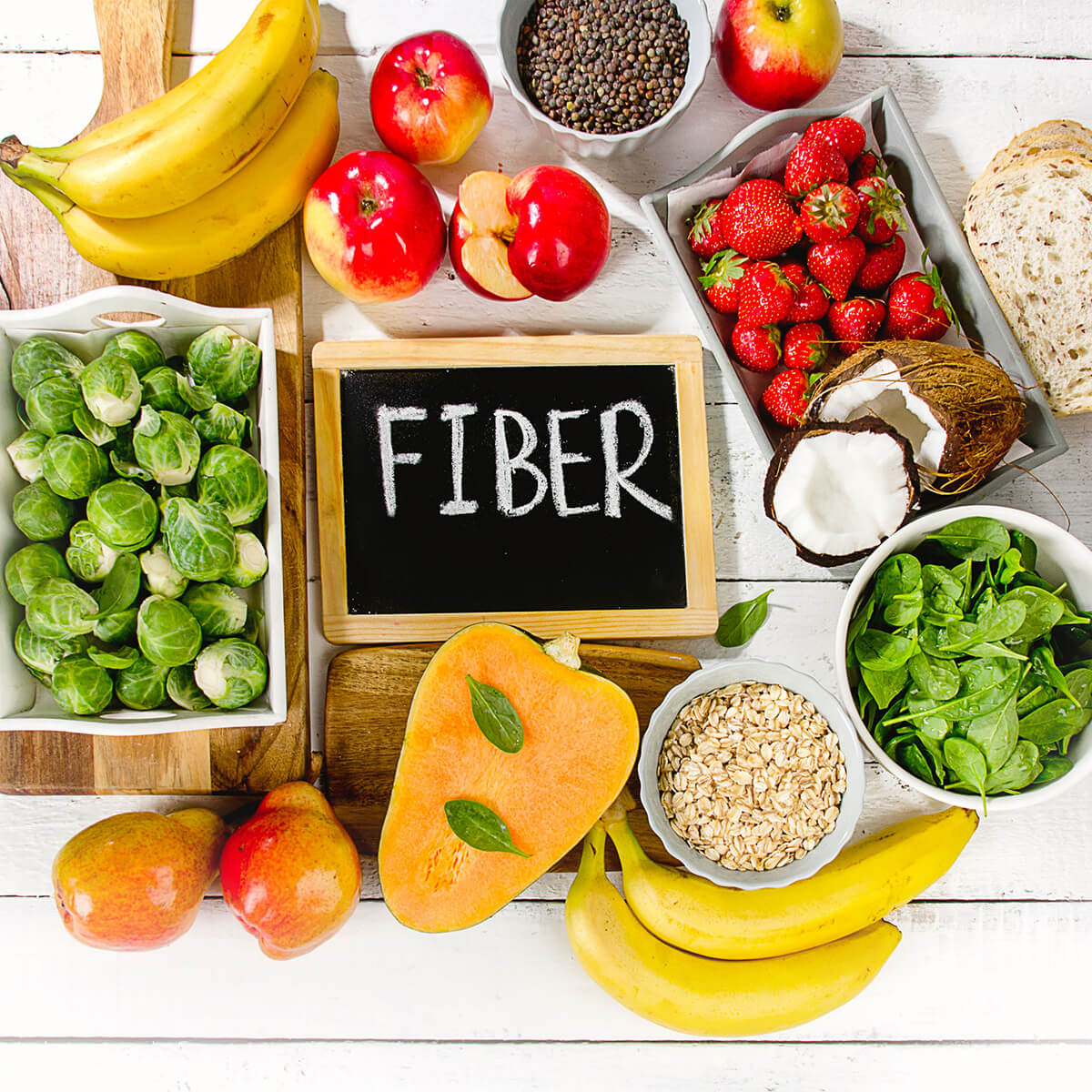Fiber After Bariatric Surgery
Lifestyle
March 22nd, 2018

Following a healthy eating plan high in fiber is a constant recommendation many of us hear frequently throughout the year. But why? And does this apply to a bariatric surgery patient? There are plenty of reasons to consume fiber as part of your healthy eating plan. Below are a few of the reasons to include fiber-rich foods as part of your healthy plan.
Fiber Aids in Weight Loss
When eating high fiber foods, they typically require more chewing. This helps you slow your pace of eating and gives your body time to realize how full you really are, by preventing overeating. Also, high fiber foods take longer to break down in the digestive system, which makes you feel full longer. High fiber foods may contain fewer calories for similar volumes of foods that are not high in fiber, which also assists in maintaining your weight.
Fiber Helps Regulate Cholesterol
Soluble fiber, the kind found in beans, oats, flaxseed, and oat bran, may help lower total blood cholesterol levels by lowering low-density lipoprotein or cholesterol levels. Many bariatric surgery patients may have had high cholesterol prior to bariatric surgery and including foods rich in fiber is another way to help decrease cholesterol levels.
Controls Blood Sugar Levels
Soluble fiber, in particular, can slow the absorption of sugar, which for those with diabetes, can help improve blood sugar levels. Consuming foods high in fiber may also reduce the risk of developing type 2 diabetes. Many bariatric surgery patients had type 2 diabetes prior to bariatric surgery and including foods rich in fiber is beneficial when it comes to controlling blood sugar levels. While bariatric surgery may resolve type 2 diabetes in many bariatric surgery patients, adding foods rich in fiber can further reduce the risk of developing type 2 diabetes or experiencing a reoccurrence of type 2 diabetes postoperatively.
Prevents Constipation
Dietary fiber increases the weight and size of your stool, as well as softens the stool. A bulky stool is easier to pass, decreasing your chance of constipation. If you have loose, watery stools, fiber may also help to solidify the stool because it absorbs water and adds bulk to the stool.
Eating foods rich in fiber can be quite beneficial to your health, but it is recommended to be cautious about adding too much fiber too quickly. Adding too much fiber to your healthy eating plan too quickly can cause intestinal gas, abdominal bloating, and cramping. Experts recommend adding fiber gradually over a period of a few weeks. This allows the natural bacteria in your digestive system to adjust to the change. It is also recommended to drink plenty of water while increasing your fiber intake. Without sufficient fluid intake, you may experience constipation when increasing your daily fiber intake.
How Much Fiber Per Day?
The Institute of Medicine (IOM) recommends that those aged 19- 50 years of age consume 25 grams of fiber per day for females and 38 grams of fiber per day for males (1). As we age, our food intake decreases therefore; those greater than 50 years of age should ingest 21 grams of fiber per day for females and 30 grams of fiber per day for males (1). Another way to calculate your personal fiber needs may be to use a formula from the IOM stating that you should consume 14 g fiber for every 1,000 calories consumed (1). Using the latter might be the best way to determine a bariatric surgery patient’s fiber needs as their calorie intake may vary dramatically from the general population, however you should always speak to your bariatric surgeon and/or dietitian before making any changes to your healthy eating plan. *
Fiber Is Great, But How Do You Fit it In?
As you can see, there are many health benefits to eating a diet high in fiber. But how do you fit all of the recommended fiber into your daily eating plan?
Fiber First.
Start the day with a fiber-rich meal. As a bariatric surgery patient, you are consistently encouraged to eat protein first While that is extremely important, eating fiber is also important. Consider starting your day with a fiber-rich breakfast cereal paired with a high-protein yogurt, such as Greek yogurt. Cereals made from bran or that are high in fiber will add about 5 grams of fiber to your daily eating plan. Oatmeal (rolled oats) is another great source of fiber. Consider adding a protein powder to your morning oatmeal to get both fiber and protein.
Whole Grain is Best.
If you are able to tolerate grains, make sure you are incorporating whole grain foods. Look for “whole wheat” or “whole wheat flour” as the first ingredient on the label. Look for at least 3 grams of fiber per serving for it to be considered a good source of fiber.
Substitution: Wheat In, White Out!
Consider substituting whole-wheat flour for white or all-purpose flour when baking. Whole grain flour is heavier than white flour. In yeast breads, use a little more yeast or let the dough rise longer. When using baking powder, increase it by about a teaspoon for every 3 cups of whole grain flour.
Eating Other Whole Grain Products
If you have not tried whole grain products before, consider trying them now. Check out brown rice, barley, whole-wheat past, quinoa, and bulgur. Some bariatric surgery patients tolerate alternative grain sources that are also whole grains better than the white grains.
Take Advantage of Ready-to-Use Fruits and Veggies
Consider mixing chopped, frozen broccoli into your spaghetti sauce. Snack on baby carrots. There are many frozen veggies now that can be heated quickly in the microwave. They even make individual serving sizes that would be great for lunches at work. If you know you will not take the time to cut apple slices as part of a healthy bariatric surgery-friendly snack, then consider purchasing the pre-sliced apple slices at your grocery store to boost your daily fiber intake.
Beans, Peas, and Lentils.
Consider adding kidney beans to canned soup and green salads. If you get a craving for nachos, make them a little healthier and spice them up by adding whole black beans with baked tortilla chips and salsa. Adding non-fat, plain Greek yogurt as a substitution for sour cream and some low-fat/reduced-fat shredded cheese on whole grain tortilla chips with black beans can be a quick and healthy bariatric surgery meal.
Eat Fruit at Meals.
Apples, bananas, oranges, pears, and berries are great sources of fiber and may help curb your sweet tooth cravings. If it fits within your daily meal plan, you may want to add a small amount of peanut butter to make a tasty, yet healthy dessert! Or try dipping cut apple slices into a Sugar-Free caramel pudding. Talk to your bariatric dietitian for other fun tips on ways to incorporate fruit and therefore more fiber into your healthy eating plan.
* A bariatric healthy eating plan should be viewed as an individualized eating plan based upon each patient’s individual medical history, laboratory studies, fitness regimen, and current weight goals. Patients should follow the instructions of their bariatric surgery team, including their bariatric surgeon and bariatric dietitian.
References:
- National Academies Press. Dietary Reference Intakes for Energy, Carbohydrates, Fiber, Fat, Fatty Acids, Cholesterol, Protein, and Amino Acids (Macronutrients). Available online at: http://www.nap.edu/read/10490/chapter/9. Accessed: November 12, 2015.
Essential Multi 3 in 1 Multivitamin Drink Powder With Calcium

$34.99
Celebrate Essential Multi 3 in 1 liquid vitamin drink mix contains a robust multivitamin, calcium citrate, and soluble fiber along with 500 mg of an antioxidant blend with added electrolytes. This is the only bariatric liquid multivitamin drink mix that… read more



